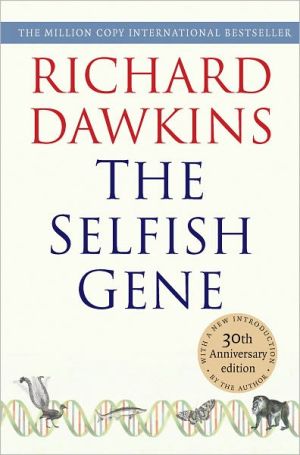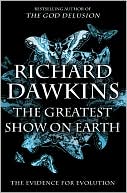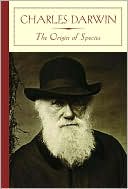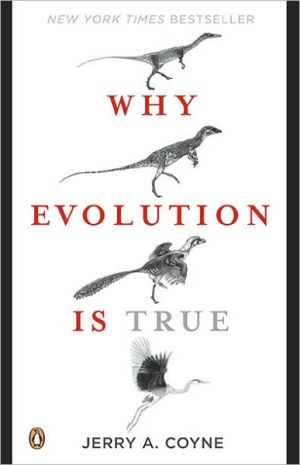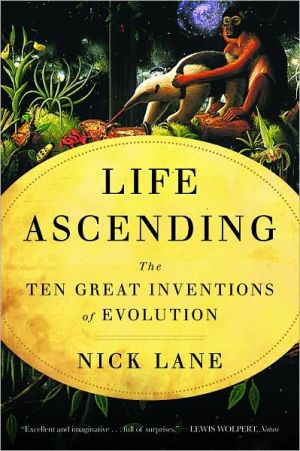The Blind Watchmaker: Why the Evidence of Evolution Reveals a Universe Without Design
Twenty years after its original publication, The Blind Watchmaker, framed with a new introduction by the author, is as prescient and timely a book as ever. The watchmaker belongs to the eighteenth-century theologian William Paley, who argued that just as a watch is too complicated and functional to have sprung into existence by accident, so too must all living things, with their far greater complexity, be purposefully designed. Charles Darwin’s brilliant discovery challenged the creationist...
Search in google:
"The best general account of evolution I have read in recent years."—E. O. Wilson. With a new introduction. Publishers Weekly Oxford zoologist Dawkins (The Selfish Gene, The Extended Phenotype trumpets his thesis in his subtitlealmost guarantee enough that his book will stir controversy. Simply put, he has responded head-on to the argument-by-design most notably made by the 18th century theologian William Paley that the universe, like a watch in its complexity, needed, in effect, a watchmaker to design it. Hewing to Darwin's fundamental (his opponents might say fundamentalist) message, Dawkins sums up: ``The theory of evolution by cumulative natural selection is the only theory we know of that is in principle capable of explaining the evolution of organized complexity.'' Avoiding an arrogant tone despite his up-front convictions, he takes pains to explain carefully, from various sides, why even such esteemed scientists as Niles Eldredge and Stephen Jay Gould, with their ``punctuated equilibrium'' thesis, are actually gradualists like Darwin himself in their evolutionary views. Dawkins is difficult reading as he describes his computer models of evolutionary possibilities. But, as he draws on his zoological background, emphasizing recent genetic techniques, he can be as engrossing as he is cogent and convincing. His concept of ``taming chance'' by breaking down the ``very improbable into less improbable small components'' is daring neo-Darwinism. Line drawings. (November 24)
Introduction to the 1996 editionPrefaceCh. 1Explaining the very improbable1Ch. 2Good design21Ch. 3Accumulating small change43Ch. 4Making tracks through animal space77Ch. 5The power and the archives111Ch. 6Origins and miracles139Ch. 7Constructive evolution169Ch. 8Explosions and spirals195Ch. 9Puncturing punctuationism223Ch. 10The one true tree of life255Ch. 11Doomed rivals287Bibliography321Index327Appendix IAn Application for the Apple Macintosh Computer335Appendix II [1991]Computer Programs and 'The Evolution of Evolvability'351
\ The EconomistAs readable and vigorous a defense of Darwinism as has been published since 1859.\ \ \ \ \ Publishers Weekly - Publisher's Weekly\ Oxford zoologist Dawkins (The Selfish Gene, The Extended Phenotype trumpets his thesis in his subtitlealmost guarantee enough that his book will stir controversy. Simply put, he has responded head-on to the argument-by-design most notably made by the 18th century theologian William Paley that the universe, like a watch in its complexity, needed, in effect, a watchmaker to design it. Hewing to Darwin's fundamental (his opponents might say fundamentalist) message, Dawkins sums up: ``The theory of evolution by cumulative natural selection is the only theory we know of that is in principle capable of explaining the evolution of organized complexity.'' Avoiding an arrogant tone despite his up-front convictions, he takes pains to explain carefully, from various sides, why even such esteemed scientists as Niles Eldredge and Stephen Jay Gould, with their ``punctuated equilibrium'' thesis, are actually gradualists like Darwin himself in their evolutionary views. Dawkins is difficult reading as he describes his computer models of evolutionary possibilities. But, as he draws on his zoological background, emphasizing recent genetic techniques, he can be as engrossing as he is cogent and convincing. His concept of ``taming chance'' by breaking down the ``very improbable into less improbable small components'' is daring neo-Darwinism. Line drawings. (November 24)\ \ \ Library JournalDawkins, author of The Selfish Gene ( LJ 12/1/76), persuasively argues the case for Darwinian evolution. He criticizes the prominent punctuationist school, and takes issue with the views of creationists and others who believe that life arose by design of a deity. Using the evolution of various animals as examples and drawing parallels from improvements in modern technology, Dawkins demonstrates the logic of the selection process and of an incremental evolution whose end products are the highly complex, functional organisms we know today. This provocative work is likely to generate further controversy in the scientific community. Recommended for informed laypersons, undergraduates, and scholars. Joseph Hannibal, Cleveland Museum of Natural History\ \ \ \ \ BooknewsReprint of the 1987 original with a new introduction & preface. Annotation c. Book News, Inc., Portland, OR (booknews.com)\ \


